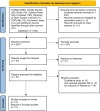Earning pocket money and girls' menstrual hygiene management in Ethiopia: a systematic review and meta-analysis
- PMID: 35787677
- PMCID: PMC9254547
- DOI: 10.1186/s12905-022-01855-2
Earning pocket money and girls' menstrual hygiene management in Ethiopia: a systematic review and meta-analysis
Abstract
Background: Many adolescent girls in Ethiopia and elsewhere missed school during their monthly cycles due to a lack of affordable menstrual absorbent materials or money to buy sanitary pads. So far, few studies have looked into the relationship between earning pocket money and maintaining good menstrual hygiene. Hence, this systematic review and meta-analysis aimed to synthesize the best available evidence regarding the association between earning pocket money and menstrual hygiene management among adolescents in Ethiopia.
Methods: We systematically searched PubMed, Hinari, Science Direct, Cochrane Library, ProQuest, POPLINE, African Journal Online, Direct of Open Access Journals, and Google Scholar for studies examining the association between earning pocket money and menstrual hygiene management among adolescent girls in Ethiopia, without restriction in a publication year. The Joanna Briggs Institute quality assessment tool for the cross-sectional studies was used to assess the quality of included studies. A prefabricated checklist, including variables: first author, publication year, sample size, type of questionnaire, and the region was used to extract data from the selected articles. A random-effect meta-analysis model was used to estimate the pooled odds ratio (OR) of the association between earning pocket money and menstrual hygiene management. The heterogeneity and publication bias was assessed by using I2 test statistics and Egger's test, respectively.
Results: Data from nine studies involving 4783 adolescent girls were extracted. The meta-analysis revealed that adolescent girls who earned pocket money from their parents or relative had 1.64 times higher odds of having good menstrual hygiene management than their counterparts [pooled OR = 1.64, 95% CI: 1.16-2.34, I2:66.7%, n = 7 (number of studies)]. Similarly, the likelihood of having good menstrual hygiene management was lower by 49% among adolescent girls who did not receive any pocket money from their parents compared to their counterparts (pooled OR = 0.51, 95% CI: 0.35-0.74, I2:48.4%, n = 2).
Conclusions: The findings revealed that adolescent girls who earned pocket money were more likely to practice good menstrual hygiene management. Progress toward better menstrual hygiene will necessitate consideration of this factor.
Keywords: Adolescent girls; Ethiopia; Menstrual hygiene; Pocket money; Sanitary pad.
© 2022. The Author(s).
Conflict of interest statement
The authors declare that they have no competing interests.
Figures






Similar articles
-
Menstrual hygiene practice among adolescent girls in Ethiopia: A systematic review and meta-analysis.PLoS One. 2022 Jan 4;17(1):e0262295. doi: 10.1371/journal.pone.0262295. eCollection 2022. PLoS One. 2022. PMID: 34982805 Free PMC article.
-
The practice of menstrual hygiene management and associated factors among secondary school girls in eastern Ethiopia: The need for water, sanitation, and hygiene support.Womens Health (Lond). 2022 Jan-Dec;18:17455057221087871. doi: 10.1177/17455057221087871. Womens Health (Lond). 2022. PMID: 35323073 Free PMC article.
-
Assessment of knowledge and practice of menstrual hygiene among high school girls in Western Ethiopia.BMC Womens Health. 2015 Oct 14;15:84. doi: 10.1186/s12905-015-0245-7. BMC Womens Health. 2015. PMID: 26466992 Free PMC article.
-
Menstrual hygiene practice and associated factors among adolescent girls in sub-Saharan Africa: a systematic review and meta-analysis.BMC Public Health. 2023 Jan 6;23(1):33. doi: 10.1186/s12889-022-14942-8. BMC Public Health. 2023. PMID: 36604734 Free PMC article.
-
Menstrual hygiene management and associated factors among adolescent school girls in gursum district, Eastern Ethiopia: Institution-based a cross-sectional study.BMC Womens Health. 2023 Jun 21;23(1):328. doi: 10.1186/s12905-023-02461-6. BMC Womens Health. 2023. PMID: 37344891 Free PMC article.
Cited by
-
Menstrual hygiene management practice and its associated factors among in-school adolescent girls in Western Ethiopia.Contracept Reprod Med. 2023 Jan 3;8(1):1. doi: 10.1186/s40834-022-00196-7. Contracept Reprod Med. 2023. PMID: 36597101 Free PMC article.
-
Assessment of menstrual hygiene management knowledge, practice, and associated factors among girls in Boset District, Ethiopia: a school-based cross-sectional study.Contracept Reprod Med. 2023 Jun 1;8(1):34. doi: 10.1186/s40834-023-00233-z. Contracept Reprod Med. 2023. PMID: 37259164 Free PMC article.
References
-
- Sarah Bumbarger. How menstrual hygiene management impacts girls in the ethiopian lowlands. Weblog. https://dt-global.com/company/blog/may-28th-2021/menstruation-health-eth.... Accessed 21 Sep 2021. [Online].
-
- Guidance on Menstrual Health and Hygiene. United Nations Children’s Fund [UNICEF]. New York, NY, USA. 2019. https://www.unicef.org/media/91341/file/UNICEF-Guidance-menstrual-health.... Accessed 21 Sep 2021.
-
- WHO/UNICEF. Consultation on draft long list of goal, target and indicator options for future global monitoring of water, sanitation and hygiene. 2012. https://washdata.org/sites/default/files/documents/reports/2017-06/JMP-2.... Accessed 21 Sep 2021.
-
- World Bank. Menstrual hygiene management enables women and girls to reach their full potential NW Washington, USA. https://www.worldbank.org/en/news/feature/2018/05/25/menstrual-hygiene-m.... Accessed 21 Sep 2021.
Publication types
MeSH terms
LinkOut - more resources
Full Text Sources
Medical

